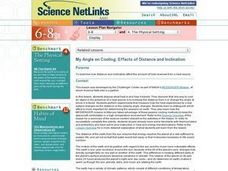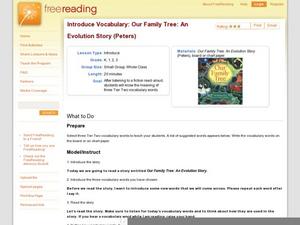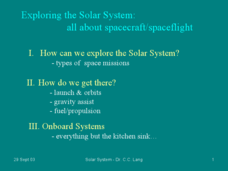Simply Worksheets
Solar System - Identifying Planets
For this space science worksheet, students read the five descriptions of various planets and match the description with the picture of the planet.
Curated OER
Sunny Symbols
After listening to a series of stories about signs and symbols associated with the United States, pupils discuss the importance of the sun in Native American legends and as a representation of New Mexico. As part of this exploration,...
TLS Books
Uranus
After reading an informational text passage, learners answer four multiple choice questions about the third largest planet in our solar system.
It's About Time
Communication Through Space
If humans do find aliens, how would we communicate with them? An intriguing lesson walks through some of the challenges associated with this question. How long would a message take to reach a specific destination, what language...
Curated OER
Unit VIII: Worksheet 4 - Central Force
Send physics learners into orbit by assigning this seven-problem instructional activity. They will calculate the mass of a satellite, construct a force diagram, determine the radius of the orbit, and more. Physics worksheets can become...
K12 Reader
What Is Gravity
This cross-curricular reading comprehension worksheet asks kids to read a short passage about gravity and then to answer questions about the article.
TLS Books
Neptune
Did you know that Neptune is named after the Roman god of the sea? Young astronomers read about this and other facts about the eighth planet from the sun in a short informational text passage.
American Museum of Natural History
What do You Know About Marine Biology
Show me what you know about the sea. Learners answer 10 questions about marine biology. The questions range from what evidence points to the origin of life to the biggest threat to oceans.
American Museum of Natural History
Meet the Universe's Main Attraction ... Gravity
Learners read a short description about gravity and what it does and then explore the two ideas about how gravity works. After gaining a better understanding of the concept, individuals participate in a thorough experiment on what would...
Curated OER
My Angle on Cooling: Effects of Distance and Inclination
Students discuss what heat is and how it travels. They discover that one way to cool an object in the presence of a heat source is to increase the distance from it or change the angle at which it is faced.
Rhythm Rhyme Results
Whatʼs the Same and Whatʼs Different?
Learn about radiation, convection, and conduction with a multiple choice worksheet. Each question prompts kids to decide what is different about each form of heat energy transfer, and what is the same.
Curated OER
Mesopotamian Gods: Handout
Ancient religion was often times closely linked to social structure and government. Hand out a handy guide that describes 12 major gods and goddesses from ancient Mesopotamia. They are each connected to a location, symbol, and force of...
Messenger Education
Mission: Possible—How Can We Plan an Exploration of Another World?
An astronaut's spacesuit weighs 280 pounds and takes 45 minutes to put on — that's a serious suit! The second activity of a three-part series allows pupils to see all that goes into space exploration. Through simulations, groups analyze...
International Technology Education Association
Dampen That Drift!
The spacecraft is drifting too far off course! Two games help explain how a spacecraft can use its thrusters to maintain its position. The games have pupils be the components of vectors in order to create and counteract the...
Glynn County School System
Light, History, Gravity, Distance, Relativity, and Space-Time
Let the star's color be the guide! The color of a star indicates its temperature and its mass and distance affect the gravitational force. The lesson presentations address these concepts as well as how the theory of special relativity...
Curated OER
Space Science: Adventure is Waiting
These full-color handouts feature two activities. The first is a reading on comets, meteors, and meteoroids. Your space science learners will examine ten phrases and determine which of the three each characterizes. The second activity...
Curated OER
Figurative Language Quiz
Combining questions about figurative language and Sandra Cisneros's The House on Mango Street, this quiz would be a good addition to your class. The majority contains questions about simile, metaphor, and personification, from...
Curated OER
Unit VI: Worksheet 1 - Constant Force/Gravitational Force
Seven problems regarding gravitational pull are presented in this physics drill. Pupils solve for displacement, time, speed, and acceleration. Critical thinking and problem solving skills are both required to complete the assignment.
Curated OER
Writing in Note Form
Taking notes is the topic today. Kids learn why notes are taken, when they are useful, and how to pick out the most important information to make their notes functional. Several interesting examples of various note forms are shown, along...
Curated OER
Introduce Vocabulary: Our Family Tree: An Evolution Story (Peters)
Lisa Peters presents macroevolution as a large-scale family tree in her book Our Family Tree: An Evolution Story. She suggests the process from single-celled organisms to modern-day humans, and learners explore new vocabulary...
Curated OER
Exploring the Solar System: All About Spacecraft/Spaceflight
Rarely do you find resources that reach high school astronomy learners. Here is something at their level! The physics of flyby missions is explained via several examples. Landing, penetrating, and roving spacecraft are examined. Diagrams...
Lawrence Hall of Science
DIY Sun Science
Get an up-close-and personal look at the sun from the safety of your classroom with this fun science application. Offering numerous activities, images, and videos, the resource supports children of all ages as they learn about the sun.
Virginia Department of Education
Planet Line-Ups
Should Pluto be considered a planet or a dwarf planet? Scholars research planets in our solar system to understand their similarities and differences. It also includes memory activities related to the order of the planets.
McGraw Hill
Metric Units of Weight and Volume
Getting the right measurements can save a lot of time and money in the real world. Learners are introduced to unit conversion and how to accurately go from one unit to another. The first pages are notes and then the packet finishes with...
Other popular searches
- Earth Science Moon Phases
- Earth Moon Sun System
- Moon and Earth Movement
- Sun Earth and Moon
- Moon Earth
- Earth and Moon Relationship
- Compare Earth and Moon
- Sun Moon Earth
- Earth and Moon and Sun
- Earth, Moon and Sun
- Forces Earth and Moon

























